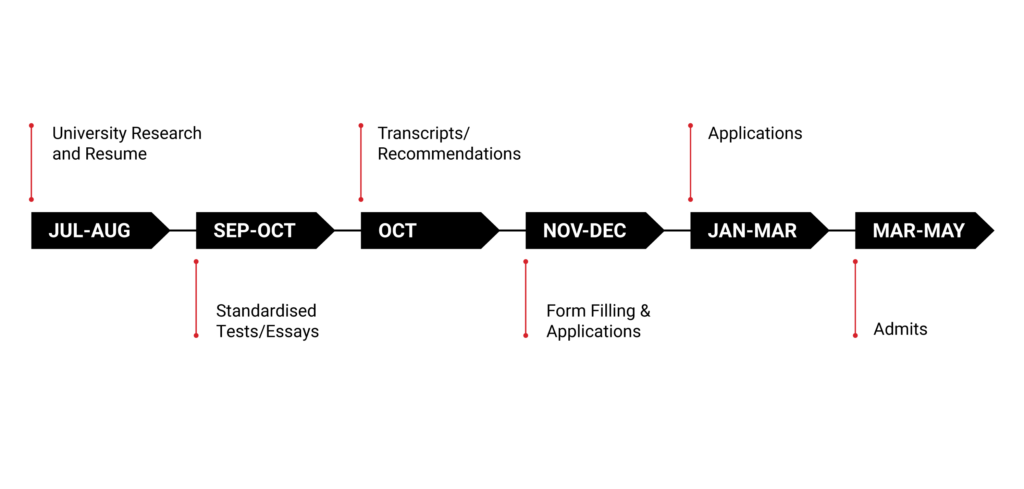For those of you who are planning to pursue a master’s education next year, you need to start working on your applications now! Most postgraduate programmes are extremely competitive, so you need to spend enough time systematically planning your postgraduate application.
When should I start my postgraduate application?
The ideal time to start your master’s application is in the year prior to when you want to begin your education. If applying to postgraduate programmes that begin in the fall, then starting in July or August is ideal. This gives you enough time to research colleges and programmes, make informed decisions, take the necessary tests, collate data and any documents required and write your statement of purpose. Most importantly, starting early allows you to evaluate your profile and build on it to ensure you stand out. For the spring intake, start between June and July of the previous year.
The Red Pen’s advice:
To make things clear for you, The Red Pen has devised an ideal application timeline:

When are the deadlines for postgraduate programmes?
Most postgraduate programmes start between August and October, known as the fall intake, with the earliest application deadline falling in October of the previous year and February of the same year. However, very few universities have their deadlines in October and those who do, target applicants who are confident in their course and career goals. Most technical universities, at least the more aspirational ones, have deadlines in November or December.
Many UK universities, such as the London School of Economics, have rolling admissions deadlines. This means that you can apply at any time once the application opens and secure your acceptance before your peers, giving you ample time to prepare for the interview process if required. The common misconception about rolling admissions is that you can apply at a later stage. However, as applications are processed as and when they are received, once the university fills its seats, it will close the application portal.
Spring deadlines fall between September and October. Many colleges, such as the London School of Economics, have rolling admissions deadlines.
The Red Pen’s advice:
An excellent way to map a fool-proof submission timetable is by first marking the fixed deadlines first, as these are the ones you have to meet. After this, you need to concentrate on your priority/dream universities and assess where you require assistance and direction with the applications. When working towards fixed deadlines, try to submit your application as early as possible. On several occasions, university portals have crashed or applicants have missed the deadlines due to time differences.
Next, put down universities with more than one application deadline. Usually, universities based in the US and Canada have three or four application rounds. Plot these strategically, so you have ample time between submissions to avoid burnout or errors.
Mid-January is an excellent time to be done with your submissions and start hoping for the best. This is also when you can steer your focus to post-application processes such as interview prep and skill development.
How should I go about my postgraduate applications?
The application process can be confusing and have a lot of requirements.
The Red Pen’s advice:
At The Red Pen, we have devised an A-B-C-D application guide to help you with your applications.
- A-Assess: The first thing that you need to do is to take some time to assess and understand your motivation for your postgraduate degree. Answers to questions such as “why do I want to study further?”, “what and where do I want to study?” and “is this programme going to help me achieve my goals?” among others will help you narrow down on the programme. This will also help you to have clarity when writing your statement of purpose (SOP).
- B-Begin: The next step is to actually start. Begin by creating an effective resume that highlights your skills and achievements. While you do this, also write to your professors and managers for letters of recommendation (LORs). These LORs will serve to endorse your profile along with good academic and work ethics.
- C-Connect: Connect with all the colleges that you think would be a good fit and make your final shortlist. Besides the resume and LORs, research the other requirements such as the SOP, GRE or GMAT and IELTS. The most daunting and time-consuming task in this step would be writing your SOP. Your SOP is your best chance to add depth to the data provided in other parts of your application and let the admission committee know about your unique self and goals. While your test scores highlight your academic calibre, your essay showcases how well you can think and translate your learning into real-life situations. An impactful and well-written essay can make all the difference when everything is equal between competing applicants.
- D-Deadline: Set and manage deadlines for each stage of the application process. Remember to add buffer time for tasks such as the English testing requirement and for retests of the GRE or GMAT, if needed.
At The Red Pen, we offer specialised postgraduate application support that involves eight to twelve months of ongoing counselling, customised course research, building well-balanced college lists, preparing the application material and meeting deadlines.
How do I start my college research?
In-depth research is the key to knowing the difference between shortlisting a university based on its ranking versus applying to one that fits in with your career objectives, personal preferences and affordability. This university research is intensive and exhaustive but is critical in helping you create your final college list.
The Red Pen’s advice:
We have worked with hundreds of applicants over the last 11 years and find that their major concern lies in interpreting university rankings and finding a good fit that aligns with their goals. So, start by identifying the right curriculum for you and gaining a clear understanding of campus culture from university websites and social media. Next, assess the university’s access to internships and job opportunities so that you can leverage these resources after you graduate. You can also reach out to current and past students in your course to get an understanding of the curriculum and ascertain their job readiness once they have graduated.
What makes a compelling application?
Over the past 11 years, The Red Pen has realised that a compelling application comes down to the following:
- An early start on the SOP: This allows you to evaluate your profile and build on it, so you stand out. A quality draft requires you to spend time understanding the elements of your academic and professional journey that aligns with your goals. Additionally, a lot of research on answering the key ‘whys’ such as why now, why a specific location, programme, university, etc. is required. In our experience, a skeleton statement of purpose draft takes anywhere between six to eight weeks to close, given that technical writing is a process and there are no shortcuts here. Our essay editors work with applicants to brainstorm narratives and help them develop storylines that meet university prompts. This process involves exchanging approximately three to four drafts. Popular colleges particularly ask for pre-requisites regarding academic coursework and/or skills to assess your preparedness and ability to deal with rigour. With time in hand and mentor guidance, you can cover these requirements and not miss out on the opportunity to apply to reputed colleges.
- Approach recommenders early to write stellar LORs for you: As easy as this sounds, LORs take the longest time to compile as they involve third parties whose accessibility is beyond your control. Often faculty/supervisors are unavailable or have found alternate employment, complicating matters further.
Putting together a master’s application takes time and careful thought. If you start planning in advance, you will not be rushing at the last minute. If you are unsure about the country to which you can apply due to your education qualifications, read this blog post. For additional information, get in touch with us.




